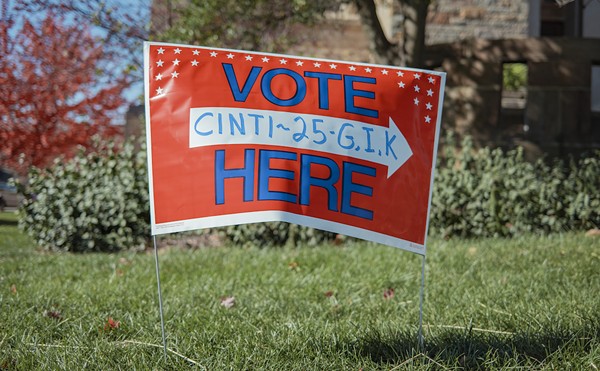Police officers in Cincinnati need to do more than attend picnics in order to establish sound community relations, according to independent mayoral candidate Michael D. Riley.
"They give a few little hot dogs and everybody's supposed to be their friends," Riley says. " 'I'm gonna beat your butt tonight, but here's a hot dog.' "
Riley says he would like to see Police Chief Thomas Streicher Jr. fired. The chief, he says, has been practically overshadowed by Keith Fangman, president of the Queen City Lodge of the Fraternal Order of Police.
"Who runs the police department — Fangman or Streicher?" Riley says. "I don't want to hear from Fangman. The police chief should report to the mayor, not the union members."
Your rights are my business
Riley, 52, is a former bookkeeper for the Hamilton County Department of Human Services and a former vendor at Findlay Market.
As a child, he wanted to be a police officer like his uncle. As an adult, he's experienced firsthand the effects of violent crime. Social issues such as the death penalty are not theoretical for him, but rather the stuff of personal experience.
Riley says his cousin murdered his father, but he is against the death penalty.
"If my cousin was killed for my father's death, what would I accomplish? Two deaths for my family," Riley says.
The rioting in April was the result of longstanding economic problems, Riley says. For many in Cincinnati, times have been hard for years, and that was part of the problem during the unrest.
"People were fed up," he says. "You're at the point where poverty is a way of life among black people. They're contented to be poor because that's all they know. It's pretty bad when someone says, 'I've got $100,' and they brag about it."
He talks about a woman who had 10 children and little education, living on welfare for years. When her government benefits ended, she had no skills to care for herself.
"When welfare ended for her, she didn't know what to do," Riley says. "You're so conditioned to be poor and live in this mindset (that) we believe if you try to assimilate into the system, you're wrong."
Frustration caused the riots in April, according to Riley, who says he was on the streets talking to young people during the disturbance.
"They didn't want to live because they were so frustrated with what was going on," he says.
Many inner-city youth show little hope for their future and little desire to live to an old age, he says.
The citywide curfew, which was enforced only in some neighborhoods, aggravated the problems, Riley says. During the curfew, he was afraid to even go in his own front yard in Evanston, he says.
"I said, 'I hope they don't arrest my dog,' " he says. "In this town, you can't buck the system. I don't care how right you are."
But that's not to say Riley doesn't try. Indeed he sees defending people's rights as a mayor's first duty.
"That's what I've been doing all my life," he says. "If you don't fight for my rights or your rights or everybody's rights, there will be rights for no one. I'm not an apathetic type of person. I fight for what is right."
Unsolved problems
Many problems in the city that need to be addressed never get any attention, according to Riley. For example, people suffering from mental illness have few places to turn. As mental institutions in Cincinnati have shut down, those who needed help had few places to go, he says.
Riley says the poor must stop allowing themselves to be content to live with less. Other people in Cincinnati should stop assuming that all young people in poverty are drug dealers.
"If everybody's a drug dealer, who's buying the drugs?" he says. "If they were getting so rich, why are they still in the projects?"
Riley believes some of the problems could be addressed if people like Mayor Charlie Luken would listen.
"He doesn't want to talk to anybody," Riley says. "You come to City Hall to speak, and he puts you out. He runs out when times are bad."
Riley knows men his age whose sons have been killed.
"People my age are taking it hard," he says. "It hurts to wake up and hear the news."
Of the 800 people in his Withrow High School class of 1966, more than 100 are dead, Riley says. At every class reunion, they "have a list of dead people."
A gag contest on WLW (700 AM), offering a free casket to the 100th shooting victim in Cincinnati, illustrated the lack of concern many people have for what's going on in the city, Riley says.
"People are dying and nobody's even investigating," he says. "It's about time someone who's not bought and paid for to stand up for what is right."
Riley says he wants to be the candidate who stands for caring about other people. If Martians came to Cincinnati and were mistreated, he says, he would probably fight for their rights, too. ©





